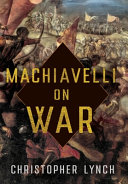

Most ebook files are in PDF format, so you can easily read them using various software such as Foxit Reader or directly on the Google Chrome browser.
Some ebook files are released by publishers in other formats such as .awz, .mobi, .epub, .fb2, etc. You may need to install specific software to read these formats on mobile/PC, such as Calibre.
Please read the tutorial at this link: https://ebookbell.com/faq
We offer FREE conversion to the popular formats you request; however, this may take some time. Therefore, right after payment, please email us, and we will try to provide the service as quickly as possible.
For some exceptional file formats or broken links (if any), please refrain from opening any disputes. Instead, email us first, and we will try to assist within a maximum of 6 hours.
EbookBell Team

4.1
90 reviewsMachiavelli on War offers a comprehensive interpretation of the philosopher-historian's treatment of war throughout his writings, from poems and memoranda drafted while he was Florence's top official for military matters to his posthumous works, The Prince and Discourses on Livy. Christopher Lynch argues that the issue of war permeates the form and content of each of Machiavelli's works, the substance of his thoughts, and his own activity as a writer, concluding that he was the first great modern philosopher because he was the first modern philosopher of war.
Lynch details Machiavelli's understanding of warfare in terms of both actual armed conflict and at the intellectual level of thinkers competing on the field of knowledge and belief. Throughout Machiavelli's works, he focuses on how military commanders' knowledge of human necessities, beginning with their own, enables and requires them to mold soldiers, organizationally and politically, to best deploy them in operations attuned to political context and changing circumstances. Intellectually, leaders must shape minds, their own and others', to reject beliefs that would weaken their purpose; for Machiavelli, this meant overcoming the classical and Christian traditions in favor of a new teaching of human freedom and excellence.
As Machiavelli on War makes clear, prevailing both on the battlefield and in the war of ideas demands a single-minded engagement in "reasoning about everything," beginning with oneself. For Machiavelli, Lynch shows, the successful military commander is not just an excellent leader but also an excellent human being in constant pursuit of the truth about themselves and the world.